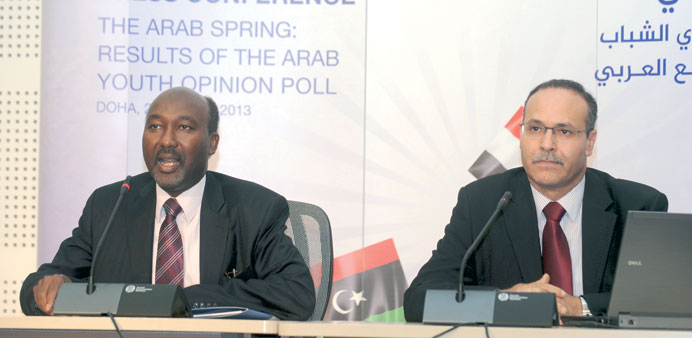By Joseph Varghese/Staff Reporter
A majority of the Arab youth feels that the parliamentary bodies and councils, formed after the recent revolutions in their countries, do not represent them.
They consider unemployment, deteriorating law and order situation and weak economy as some of the major challenges faced by these countries. These are some of the major findings of an opinion poll conducted by Al Jazeera Centre for Studies recently.
Giving the details of the opinion poll at a press conference at the Al Jazeera Centre yesterday, Salah El Zein, the director of the Al Jazeera Centre for Studies, said :”Respondents unanimously agreed that the high rate of unemployment is the most prominent risk that the Arab Spring countries are facing. The deteriorating security situation and the weak economic scenario are at the forefront of the challenges facing the Arab revolutions.”
Dr Ezzeddine Abdelmoula, head of Research, Al Jazeera Centre for Studies, explained the findings of the opinion poll.
The opinion poll was conducted among youth in Tunisia, Egypt, Libya and Yemen where the Arab Spring resulted in regime change.
The poll was divided into four general themes of the reality of the revolutions, its achievements and failures, the challenges that it faces, and the risks that surround it.
The poll also tried to understand the youths’ expectations of the Arab Spring, and their aspirations for future.
According to the poll, a majority of the Arab youth rejects the idea of military role in politics and wants the military establishment to stay away from politics.
Similarly, more than 90% of youngsters rejected party affiliation and did not want to belong to any political party in future.
The poll pointed out that corruption and the deterioration of the economic situation were the most important causes of the revolution, and the youth, the main contributing factor of its success.
Another finding of the poll is that majority of the youngsters prefer Islam as their primary identity with their national identity coming second, except in Egypt where 62% of the respondents rooted for their national identity.
However, in all four countries, the respondents agreed that Islamic Shariah should be the main source of legislation.
The respondents in most of the countries confirmed that there was a clear progress in the field of freedom and human rights. As for freedom of expression, most respondents indicated that it was guaranteed after the revolution. Similarly, majority of respondents indicated that freedom of the press was assured after the revolution.
Despite their negative assessment of the pace of change in these countries, most of the respondents expressed optimism about future. “In spite of their dissatisfaction on what has been achieved in areas of economy, public services and social justice, the youth are optimistic about future. They believe that these revolutions will achieve their objectives in due time, especially with the witnessed achievements in the fields of human rights and freedom,” added El Zein.
The poll suggests that even after two years since the start of the revolutions of the Arab Spring, the political scene remains disorganised. The current position of the youth, who were instrumental in bringing out the changes in political scenario and in the new institutions of governance, does not seem to correspond with the role they exercised.
The poll was carried out for Al Jazeera Centre for Studies by Sigma Conseil from 15 April to 25 May 2013 among 8045 men and women between the ages of 17 and 31.

Salah El Zein and Dr Ezzeddine Abdelmoula address the press conference. PICTURE: Shemeer Rasheed
